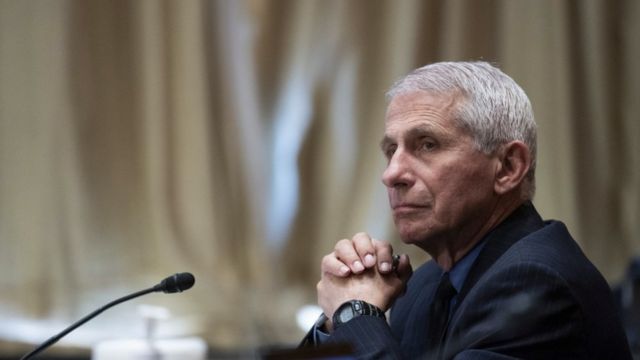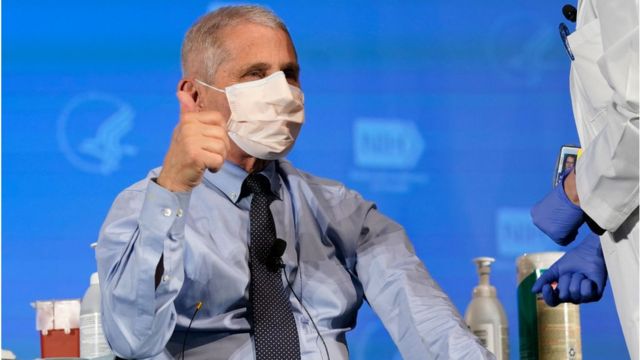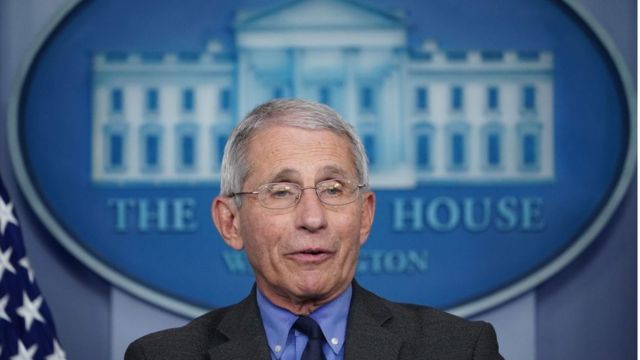Covid-19: White House defends Fauci on Chinese laboratory and pandemic theory
Anthony Fauci becomes the face of US anti-pandemic efforts
The White House came to the defense of its top adviser on the covid-19 pandemic, Dr. Anthony Fauci, after e-mail messages from the expert became public and sparked controversy.
Fauci has been the face of the US response to the new coronavirus, drawing praise and criticism. "I trust Dr. Fauci very much," President Joe Biden said on Friday (4/6).
But emails from Fauci raised questions about whether he agreed with Beijing's rejection of the theory that the pandemic started with an accident at a laboratory in Wuhan.
A series of messages from Fauci about the outbreak's beginning were released this week to the media under a request for access to information.
In an interview with CNN, Fauci said that the email was taken out of context by his critics and that he had an "open mind" about the origin of the virus.
In his defense, White House press secretary Jen Psaki said Fauci's contributions to fighting the pandemic had "undeniable value."
In her daily press conference on Thursday (3/6), she said: "The president and government believe that Dr. Fauci has played an incredible role in keeping the pandemic at bay by being a voice to the public during throughout this pandemic."
Biden reiterated his support after commenting on Friday when a reporter asked if he still had confidence in the infectious disease specialist.
There is no evidence that covid-19 left a lab, but Biden ordered a review of the matter that angered China.
Chinese authorities have linked the first cases of covid-19 to a seafood market in Wuhan, leading scientists to theorize that the virus was transmitted to humans by animals.
But recent US media reports have suggested mounting evidence that the virus might instead have emerged from a laboratory in Wuhan, perhaps from an accidental leak.
What did Fauci tell CNN?
'I think the most likely origin of the pandemic is a leap of the virus between species,' reaffirmed the doctor.
Fauci said there was nothing inconvenient or inappropriate about the exchange of emails between him and an executive at a nonprofit medical organization that helped fund research at a disease institute in Wuhan, the Chinese city where covid-19 was reported by first time.
The NIH, which is a US public health agency, donated $600,000 to the Wuhan Institute of Virology between 2014 and 2019 through a grant to the non-profit EcoHealth Alliance, based in New York, with the objective of researching coronaviruses in bats.
Peter Daszak, president of the EcoHealth Alliance, emailed Fauci in April 2020, praising him for being "brave" in refuting the laboratory leak theory. "Thank you very much for your kind message," replied Fauci.
Fauci told CNN that it was "nonsense" to try to infer from the email any relationship between him and the figures behind the Wuhan lab research.
"You can misinterpret it any way you like," he said, "this email was from a person thanking me and saying 'thank you' for something she thought I said, and I said I think the most likely source is a jump between species. I still think it is, while I'm keeping an open mind that it might have been a lab leak."
He added: "I think the idea is quite far-fetched that the Chinese deliberately planned something so that they could kill themselves as well as other people. I think that's a bit exaggerated."
Allies of the expert say Fauci's messages show nothing more than a dedicated public servant trying to navigate the early days of a once-a-century pandemic.
But his critics are suggesting that Fauci may have been involved in covering up an alleged leak, and even claim he committed perjury while testifying to Congress.
How did the laboratory leak theory gain traction?
According to an investigation in Vanity Fair magazine published on Thursday, State Department officials discussed the origins of the coronavirus at a meeting on Dec. 9, 2020.
They were instructed not to address innuendos about "gain of function" experiments with viruses in Wuhan's lab to avoid drawing unwanted attention to US government funding for such research, Vanity Fair reported.
Gain-of-function studies involve altering pathogens to make them more transmissible in order to learn more about how they can mutate.
The Wall Street Journal reported last month that three institute employees in Wuhan fell ill and were hospitalized in November 2019, just before the first covid-19 cases were reported.
Days later, President Biden instructed US spy agencies to conduct a 90-day analysis to see if the virus could have emerged from a Chinese laboratory.
His government had previously forwarded answers to the World Health Organization on how the pandemic began.
Former President Donald Trump demanded responses from Fauci
"I would like to see the medical records of the three people who allegedly became ill in 2019," Fauci told the Financial Times on Thursday. "Did they really get sick and, if so, why did they get sick?"
He asked China to also release the medical records of six miners who fell ill after entering a bat cave in 2012 in China's Yunnan province. Three miners died, and Chinese researchers later visited the cave to collect samples from the bats.
"It's totally possible to think that the origins of Sars-CoV-2 were in that cave and started to spread naturally or passed through the lab," he said.
Robert Redfield, who led the Centers for Disease Control and Prevention, a US agency dedicated to the issue, during the Trump administration, told Vanity Fair that he received death threats from other scientists when he supported the Wuhan lab leak theory.
"I was threatened and ostracized because I proposed another hypothesis," said Redfield. "I expected that from politicians. I didn't expect it from science."
What did Fauci say earlier?
During his testimony to Congress on May 12, Fauci emphatically denied that the United States had ever funded the controversial gain-of-function research in Wuhan's laboratory.
During a subsequent Senate hearing on May 26, Republican Senator John Kennedy asked how Fauci could be sure that Wuhan scientists would not have used the money for role-play research.
"There is no way to know," acknowledged Fauci, adding that he believed Chinese researchers were "reliable."
How was the political reaction?
Former President Donald Trump, who was widely criticized last year when he raised the possibility that the covid-19 would come from Wuhan's lab, said on Thursday that Fauci had many questions to answer.
"What did Dr. Fauci know about the 'gain of function' research and when did he know about it?" Trump said in a statement. "China should pay $10 trillion dollars (BRL 50.7 trillion) to the United States and the world for the death and destruction they caused!"
On the same day, Republican Deputy House of Representatives leader Steve Scalise demanded in a letter that Fauci testify to Congress about "the role of the US government in funding research that may have contributed to the development of the new coronavirus ".
China's Foreign Ministry said last week that the Wuhan lab leak is "extremely impossible".



No comments:
Post a Comment